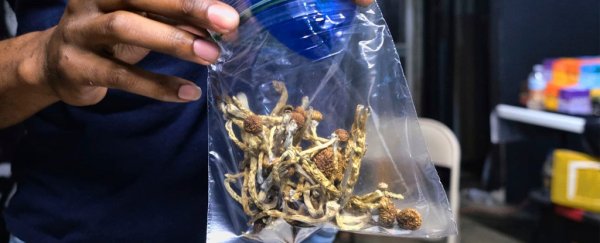Oakland's city council unanimously passed a resolution Tuesday that decriminalizes the use of entheogenic plants, a category that includes flora such as "magic mushrooms", cactuses, and iboga that can induce a psychedelic experience.
Oakland is the second city in the country, after Denver, to decriminalize these substances. However, magic mushrooms still remain illegal under federal and California laws.
The resolution states that law enforcement should not prioritize arresting or investigating adults who use the substances and that the county should not prosecute people involved in their use.
But it does not authorize driving under the influence of these drugs. It does not create any marketplaces or commercial sale mechanisms for distribution of entheogenic plants, and bars their distribution at schools.
The effort was started by Decriminalize Nature Oakland (DNO), which bills itself as a campaign to educate the public about the use of entheogenic plants to "decriminalize our relationship to nature".
Supporters of the resolution argue that these drugs have medical and spiritual benefits and have historically been used by some cultures for healing and in rituals.
Councilman Noel Gallo introduced the resolution after being approached by DNO, but he told The Washington Post that his family has had a long history of cultivating and using entheogenic plants.
"Half of my family is Native American," he said. "I grew up with my grandmother, and those plants were visible in our backyard. We didn't have a Walgreens in the neighborhood."
When his nephew was severely injured in the Iraq War, Gallo said that "some of these plants were able to help him get his life back together."
Gallo said he consulted with doctors, nurses and patients, as well as DNO, before putting the resolution forward. He said that the council would reevaluate the policy in a year to see whether any changes needed to be made.
Supporters of the resolution cheered after its passage Tuesday evening, the San Francisco Chronicle reported.
DNO's co-founder, Nicolle Greenheart, told the Chronicle that she was "glad that our communities will now have access to the healing medicines and we can start working on healing our communities."
There was one skeptic on the city council, however. Councilman Loren Taylor had expressed worry ahead of the resolution's passage: "It is something that could be taken advantage of," he told Marijuana Moment, a blog dedicated to policy and business coverage of cannabis, in late May.
"That's the piece for me. I want to make sure we're thinking through all the implications."
Taylor added an amendment to the resolution on Tuesday that said it did not authorize the manufacturing or sale of the substances, the Chronicle reported. It also clarifies that certain potential users should consult a physician before using the drugs.
The resolution, as passed, also includes warnings that "etheogens are not for everyone" and sets out recommendations to "ensure safe and responsible use" of these plants.
Gallo's report on the resolution, submitted to the council in May, also states that "since DNO believes entheogens should not be commodified, there will be no sales of entheogenic plants and fungi and we will work closely with local communities to share resources."
2019 © The Washington Post
This article was originally published by The Washington Post.
